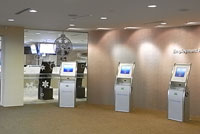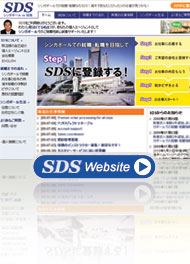Japanese Companies Bring English Into Japan
 By March 2012, English will be made the official company language for Fast Retailing Co., the operator of Uniqlo - the very successful Japanese casual clothing chain. By March 2012, English will be made the official company language for Fast Retailing Co., the operator of Uniqlo - the very successful Japanese casual clothing chain.
The japanese company's executives will have to primarily use English for its meetings and documentation, both at their local offices in Japan and branch offices overseas.
As Fast Retailing Co. is aggressively expanding its overseas operations, it's Chairman and President - Mr Tadashi Yanai, explained "This move is necessary for a Japanese company to survive as a global corporation". Fast Retailing currently runs 809 stores in Japan and 136 outlets overseas (54 in China, 48 in South Korea, 17 in Europe, 13 in Hong Kong, and 1 in United States). The company has set an ambitious target of increasing its current sales by 7 folds, ie. 5 trillion yen, by year 2020. Overseas sales accounted for 10.1 per cent of its overall revenue for the half-year ending in February 2010. It's goal included increasing the portion of sales from overseas operations to 70 per cent in 2020.
Executives and store managers in non-English speaking countries, including Japan and China, will be obligated to undergo English communication training. Employees will be required to earn a score of minimum 700 points for TOEIC - Test of English for International Communication. Mr Yanai calls this "the minimum level which would enable an employee to fulfill his or her duties abroad". Fast Retailing intends to standardize the pay structure for executives worldwide and to transfer employees at the store manager level to overseas posts on a routine basis. In addition, the company also plans to increase the ratio of foreigners during its future recruitment. It targets to employ 50 per cent foreigners out of 600 new recruits in 2011, two-thirds of the 1,000 recruits in 2012, and three-fourths of the 1,500 recruits in 2013.
Other Japanese firms that have adopted English as their official language includes Nissan Motor Co., headed by President Carlos Ghosn. Internet shopping giant - Rakuten, is one of the very few companies headed by Japanese, to also make the move to use English as their in-house language. Rakuten's Chief Executive Officer - Mr Hiroshi Mikitani, aimed to make English the medium of communication among its employees by 2012. About 200 of its employees go through a four hour gruelling English lesson every afternoon held in Rakuten's meeting rooms. However, as Rakuten is a company used to working on tight budgets, employees have to pay for their own English lessons.
English is hardly spoken in Japan as the average Japanese, who is either not involved in international commerce or does not come into contact with foreigners on a daily basis, will have no use for the language. On the other hand, Japan is one of the world's translation powerhouse, as English books, films and other kinds of material are largely available in Japanese versions. Companies like Rakuten and Fast Retailing Co., who attempt to turn its staff into fluent speakers in two years can be described as admirable, but the bigger challenge would lie on their employees.
Japanese Companies Take Japanese Overseas
At the same time, many other large Japanese companies are increasingly outsourcing and sending white-collar operations to China and Southeast Asia, where doing business costs less than in Japan.
Japanese outsourcers like Transcosmos and Masterpiece have set up call centers, data-entry offices and technical support operations staffed by Japanese workers in cities like Bangkok, Beijing, Hong Kong and Taipei. Such outposts cater to Japanese employers who say they cannot do without Japanese workers for reasons of language and culture. Even foreign citizens with a good command of the Japanese language, they say, may not be equipped with a sufficiently nuanced understanding of the manners and politesse that Japanese customers often demand. Managing Director of Transcosmos Thailand (a unit of Transcosmos) - Mr Tatsuhito Muramatsu, expressed "If you used Japanese-speaking Chinese, for example, the service quality does not match up with the expectations of the end customers". Japanese outsourcers are hiring Japanese workers to do the jobs overseas and paying them considerably less than if they were working in Japan. Transcosmos pays a call center operator in Thailand a starting salary of about 30,000 baht, or $930, a month - less than half of the JPY220,000, or $2,500, the same employee would get in Tokyo.
According to data released by the Japanese Foreign Ministry, although the number of workers sent overseas by Japanese companies on traditional expatriate packages fell 0.32 per cent, the number of "independent business people" or freelance contractors undertaking offers in overseas work at lesser salaries than the same work in Japan rose by 5.69 per cent. Many of such workers headed to cities like Shanghai and Bangkok, where net increases of Japanese residents have been recorded in the past several years, according to the ministry. While Transcosmos executives recognize that some Japanese have sought work in Thailand because they could not find employment at home (Government statistics showed that Japan lost 240,000 jobs in May), they say that the job performance of their Thai-based operators is superior to that of counterparts in Japan.
Chief operating officer of Pasona Global (which helps its clients find Japanese workers overseas) - Mr Kazuyuki Ichikawa, explained that with the Japanese population aging and shrinking, and more Japanese companies seeking avenues of growth overseas, job opportunities for Japanese abroad are likely to grow. On the preference of Japanese companies recruiting Japanese employees overseas over the locals, he elaborated "You say one thing and Japanese employees will understand three things. In Western cultures, you might be straightforward with what you want your staff to know, but a Japanese manager would want you to understand it without having to say it."
|

 By March 2012, English will be made the official company language for Fast Retailing Co., the operator of Uniqlo - the very successful Japanese casual clothing chain.
By March 2012, English will be made the official company language for Fast Retailing Co., the operator of Uniqlo - the very successful Japanese casual clothing chain.
 Applicants submit their fingerprints as part of the Employment Visa application at the Ministry of Manpower (MOM). MOM's centralised database computerised system is indeed organised and impressive. Any subsequent online visa applications, that used to take 2 to 3 weeks to complete, now takes only a few hours (1 day at most). Just the other day when I made a trip overseas, I realised that at Singapore Immigration, even Employment Pass holders and Permanent Resident (PR) holders can make use of the fingerprint customs check facility at immigration counters. I am eager to find out how else would Singapore be making use of their centralised database computerised systems to improve efficiency in other ways.
Applicants submit their fingerprints as part of the Employment Visa application at the Ministry of Manpower (MOM). MOM's centralised database computerised system is indeed organised and impressive. Any subsequent online visa applications, that used to take 2 to 3 weeks to complete, now takes only a few hours (1 day at most). Just the other day when I made a trip overseas, I realised that at Singapore Immigration, even Employment Pass holders and Permanent Resident (PR) holders can make use of the fingerprint customs check facility at immigration counters. I am eager to find out how else would Singapore be making use of their centralised database computerised systems to improve efficiency in other ways.
